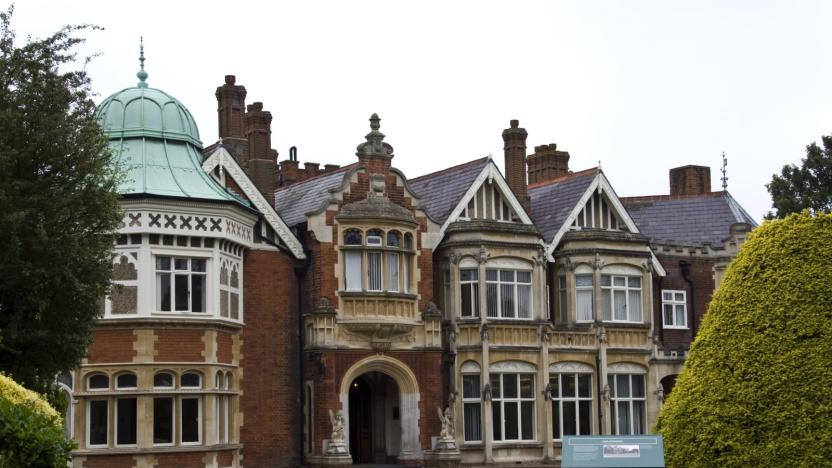bletchleypark
Latest

UK's Bletchley Park to host cybersecurity boarding school
Bletchley Park will once again serve as a cryptographic hub in the UK. Plans are afoot to create a new "National College of Cyber Security" in G-Block, a building which is currently in a state of disrepair. It's scheduled to open in 2018 and will serve as a specialised six-form college, teaching teenagers the fundamentals of encryption and computer science. As the Guardian reports, the center will take up to 500 students at any one time and offer free tuition, funding its efforts through venture capital, corporate sponsorship and possibly state funding instead. It's envisioned as a boarding school, however a day tuition option will also be available.

One of the first mass-produced computers getting new life in UK museum
While Howdy Doody and Buffalo Bob Smith were regaling America's youth with Western-themed puppet antics and the Cold War was starting to get serious, British businessmen were employing one of the world's first out-of-the-laboratory computers: the ICT 1301. The massive computer, which resembles a prop from Lost's underground bunker more than something you'd see in modern times, is getting a new life from the National Museum of Computing in the UK's historic Bletchley Park. The University of London is providing the ICT 1301 (last used for grading tests, apparently), which is nicknamed "Flossie." Apparently TNMOC is hoping to have it on display by some point in 2016, and the machine is said to still work. It was purchased by the university back in the '60s, not long after the initial rollout of ICT 1301 computers took place. Just 150 iterations of the machine exist, and Flossie is said to be the last functioning model. It's been a struggle getting Flossie into the museum, despite its history -- the machine spent nine years being rehabbed, among other challenges. Hilariously, other copies of the ICT 1301 were used as props in various UK productions throughout the years, from Doctor Who to James Bond. And the first of you to spot one in an old episode and send us an image gets a banana sticker! And very likely a cat GIF!

Google brings Bletchley Park to its Cultural Institute (video)
For an unsentimental Silicon Valley giant, Google does have a soft spot for Bletchley Park, the wartime home of Alan Turing and his codebreakers. Having previously donated $850,000 to help restore the site, which now houses the National Museum of Computing, Mountain View has now welcomed pictures and testimony from those who were there to its own online museum, the Google Cultural Institute. There's video after the break, and you can head down to the source links to find out more about the vital work that took place.

Harwell Dekatron revived as the world's oldest working, original digital computer
Over 60 years since the first digital computers switched on, the chances of seeing one of these pioneers in action have grown incredibly slim as time (and recycling) takes its toll. Take a visit to Britain's National Museum of Computing in Bletchley Park as of today, however, and you'll see one working. A finished 3-year restoration effort lets the Harwell Dekatron -- at one point renamed the Wolverhampton Instrument for Teaching Computation from Harwell, or WITCH -- claim the title of the world's oldest functional digital computer still using its original design. Aside from its room-filling dimensions, the 1951-era mainframe may be worth the trip just for recalling a time when there were no hard and fast rules in computing: the Dekatron operates in its namesake decimal system, not binary, and puts most of its components on full display. The computer is part of the regular exhibit lineup and should be easy to see; the daunting part may be realizing that virtually any chip in a 2012 smartphone could outmuscle the Dekatron without breaking a sweat.

Google donates $850,000 to restore home of the codebreakers
Google has donated £550,000 ($850,000) towards the £15 million project to renovate Bletchley Park. The donation from Mountain View is part of a $100 million charitable program that's previously helped rescue Alan Turing's personal papers. The country estate is the former home of Station X and the British Government's Code and Cypher School, which was where the World War Two model of the Enigma Machine was decrypted. Turing, its most famous alumnus went on to pioneer computer science and artificial intelligence during his short life and the complex now houses the National Museum of Computing. Unfortunately the buildings are rapidly collapsing and enormous investment is still required to transform the site into a museum, attraction and fitting tribute to the work of the codebreakers.

Britons build working replica of the Turing Bombe
Just in case Al Qaeda or other "evildoers" du jour decide to start communicating in code via the WWII-era Enigma code -- we'll have the Turing Bombe on our side. This working replica of the machine used by British cryptologists at Bletchley Park, the epicenter of the counter-Enigma effort was unveiled at that site earlier this week. According to an article by The Register: "The Bombes used 108 electromagnetic spinning drums to test combinations of letters and reveal the likely keys to the Enigma code used in a particular message." The article goes on to say that Churchill ordered the 200 Bombes that had been built dismantled by the end of the war, and that it wasn't until the 1970s that the classified nature of these devices was lifted. Unlike the shrouded secrecy that its original was wrapped in, this replica will be open to the public -- from September 23-24, there will be a reunion of Bletchley Park veterans and a special demonstrations with war re-enactors in period dress. No word on who will play Alan Turing, though, but our own England bureau chief, Conrad Quilty-Harper, is a likely candidate.[Via The Register]



